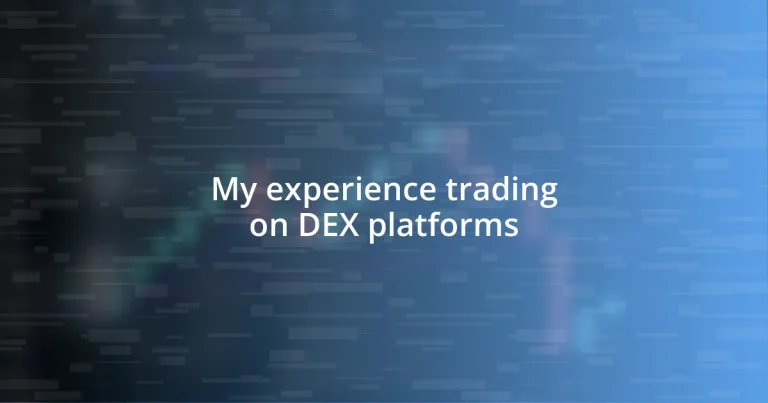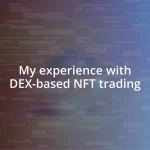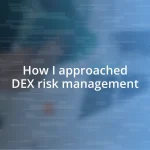Key takeaways:
- Decentralized exchanges (DEX) provide enhanced privacy, control over assets, and a wider range of tokens but require navigating complex interfaces.
- Key factors in choosing a DEX include security, user-friendliness, liquidity, and community support to minimize trading risks.
- Successful DEX trading relies on clear goals, careful research, emotional discipline, and community engagement to inform decisions and strategies.

Introduction to DEX platforms
When I first stumbled upon decentralized exchange (DEX) platforms, I was captivated by the idea of trading without intermediaries. It felt revolutionary, empowering me to take control of my assets directly. But what exactly makes DEX platforms stand out in the crowded world of cryptocurrency?
Unlike traditional exchanges, where you rely on a centralized authority to facilitate your trades, DEX platforms utilize smart contracts on the blockchain. This means my orders were executed automatically and transparently, which added a layer of trust I hadn’t anticipated. I remember the first time I made a trade; the sense of liberation was invigorating, but I couldn’t help but wonder—was I fully grasping the risks involved?
The beauty of DEX platforms lies in their ability to offer users greater privacy and access to a wider range of tokens. Yet, I often found myself asking: are they for everyone? While I enjoyed the autonomy, navigating the sometimes complex interfaces and understanding liquidity pools required a learning curve that not everyone might be willing to tackle.
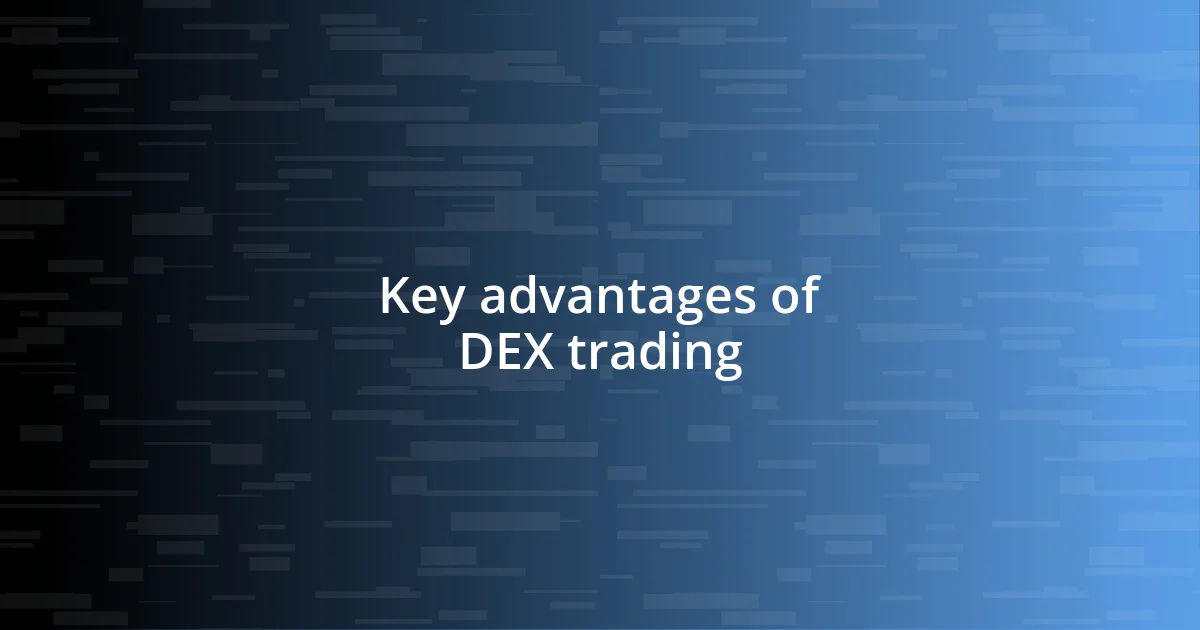
Key advantages of DEX trading
One of the key advantages I found with DEX trading is the enhanced privacy it offers. I remember the first time I used a DEX; I didn’t have to provide extensive personal information, and that felt refreshing. It was empowering to know that my trades weren’t just another line in someone else’s database, but rather my own private transactions on the blockchain. This autonomy allows traders to feel more secure, particularly in a world where data breaches are all too common.
Here are some other notable advantages of DEX trading:
- Improved Control: You maintain ownership of your private keys, so you’re not trusting an exchange with your funds.
- Wider Asset Selection: Many DEX platforms offer a vast range of tokens, even those that may not be available on centralized exchanges.
- Reduced Counterparty Risk: Since trades occur directly between users, the risk of exchange failures is significantly minimized.
- Lower Fees: Generally, DEX transactions might involve lower fees compared to their centralized counterparts, enhancing profits over time.
- Global Accessibility: Regardless of where you are, you can access DEX platforms as long as you have internet connectivity. I’ve traded from several different locations, and knowing that I can access my assets anywhere is invaluable.

Choosing the right DEX platform
When I was on the hunt for a DEX platform, I quickly realized that not all exchanges are created equal. I considered factors like security features, user interface, and the variety of tokens available. One platform may have an excellent reputation for security, but if the trading interface isn’t user-friendly, I could end up feeling frustrated and making costly mistakes. It’s about finding that balance that works for my trading style.
Another crucial aspect I focused on was liquidity. I remember a time when I faced slippage on a trade due to low liquidity on a specific DEX. That experience taught me the importance of checking trading volumes before committing to a platform. A higher volume usually indicates better liquidity, which means I can execute trades at a price closer to what I see on my screen—an essential factor for minimizing unexpected losses.
Finally, I always keep an eye on the community and support options the DEX offers. Some platforms have active communities where I can share insights and seek advice. Conversely, others may lack proper support channels, leaving me on my own when issues arise. Choosing the right DEX platform isn’t just about the technical features; it’s also about feeling supported in my trading journey.
| Feature | Comparison |
|---|---|
| Security | Varying levels of smart contract audits and user control |
| User Interface | Some are intuitive, while others may require a steep learning curve |
| Liquidity | Higher volume facilitates smoother trades |
| Community Support | Some offer active forums; others provide minimal assistance |

Understanding liquidity and slippage
Understanding liquidity and slippage is crucial for anyone trading on DEX platforms. I still remember the first time I encountered slippage while trying to execute a trade. The prices shifted so quickly that my order was filled at a much worse rate than I anticipated, leaving me frustrated. That particular experience opened my eyes to how liquidity can dramatically affect my trading outcomes.
Liquidity, in simple terms, refers to how easily an asset can be bought or sold without impacting its price. On a busy DEX, I can often make trades seamlessly because plenty of buyers and sellers are ready to take part. However, on a platform with lower liquidity, my trades might get delayed or executed at a price that doesn’t reflect the market. Have you ever wondered why some assets seem to swing wildly in price? It’s often due to this lack of liquidity, where even a small trade can tip the scales dramatically.
I learned that monitoring the trading volume is a smart way to gauge a DEX’s liquidity. There was a time I decided to jump into a less popular altcoin that had minimal trading activity, and I was left with a sizeable position that I struggled to sell without incurring significant losses. It was a harsh lesson in the importance of liquidity—one I won’t forget anytime soon. Having a strategy in place to check for liquidity before diving into any trade has since became an essential part of my routine.
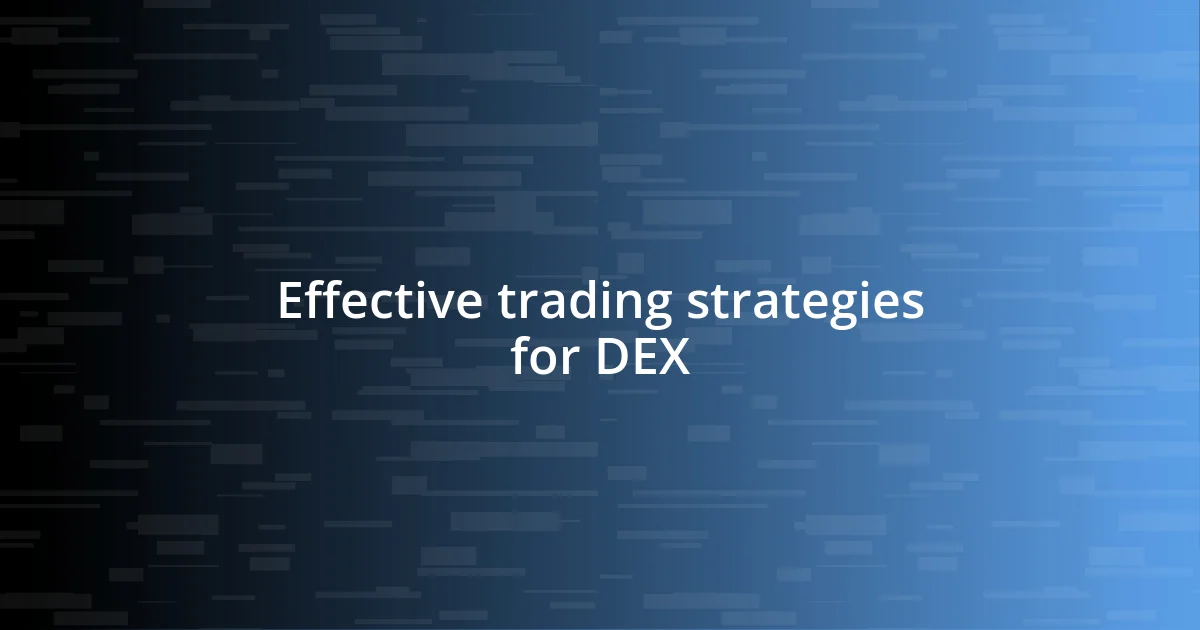
Effective trading strategies for DEX
When trading on a DEX, I’ve found that setting clear goals is foundational to my strategy. Early on, I remember diving into trades without knowing whether I was aiming for short-term gains or long-term holds. This lack of clarity led to anxiety and missed opportunities. Now, I take the time to define whether each trade aligns with a specific goal, which helps me remain focused and reduces the emotional rollercoaster that often accompanies DEX trading.
Another strategy I’ve embraced involves using limit orders instead of market orders. I recall a time when I quickly submitted a market order and was hit with unexpected slippage. It made me realize how limit orders can protect me from such shocks by locking in my desired price. This not only gives me better control over my trades but also alleviates some of the stress from rapid price movements. Have you noticed how sometimes prices can jump within seconds? Limit orders add a layer of certainty that I’ve grown to appreciate.
Finally, I always analyze market trends and sentiment before making moves. There was an occasion when I disregarded the prevailing sentiment in favor of a popular-coined whisper, which resulted in a significant loss. Since then, I started following community discussions and researching news that impacts the crypto landscape. This practice has become second nature to me, allowing me to make more informed decisions that align with the market’s mood. Remember, trading isn’t just about the numbers; it’s also about understanding the forces that drive those numbers.

Common pitfalls to avoid
One of the most common pitfalls I’ve encountered while trading on DEX platforms is neglecting to do proper research on the assets I’m considering. I remember one particular incident when I jumped into a trending token without understanding its fundamentals. The hype was intoxicating, but just a week later, the price plummeted. This experience taught me the invaluable lesson that hype can be fleeting; I now always take the time to research an asset’s background before investing.
Another mistake I see many traders make, including myself early on, is underestimating security measures. There was a time I connected my wallet to an unverified DEX, thinking it would be a quick trade. I learned the hard way that decentralized doesn’t always mean safe. Since that incident, I’ve become diligent about ensuring that I’m using secure, reputable platforms and that I’ve activated any additional security measures available, like two-factor authentication.
Lastly, I’ve noticed that an emotional approach to trading can lead to poor decisions. I used to chase losses, believing that if I just invested a little more, I could recoup my funds. This often led me down a rabbit hole of bad trades. Through experience, I’ve learned that maintaining a level head and sticking to a pre-defined trading plan, regardless of market fluctuations, is essential for long-term success. It raises an important question: How can we expect to succeed in the chaotic world of DEX trading if we let our emotions take the lead?
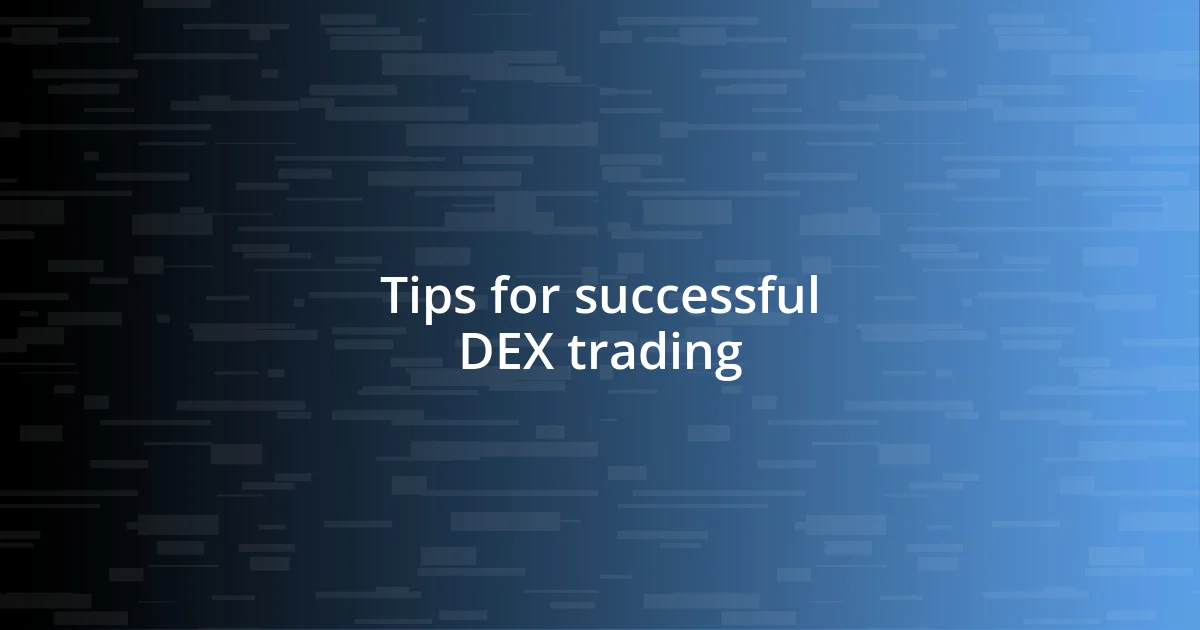
Tips for successful DEX trading
When diving into DEX trading, I’ve learned the importance of timing. I once rushed into a trade thinking I would catch a rising wave, only to see the market shift and my gains evaporate. Now, I take a step back to observe price patterns and overall market behavior before entering a position. Does it ever feel like timing is everything in trading? Trust me, it truly is.
Another valuable tip I’ve garnered is the necessity of diversifying my assets. Early in my journey, I relied heavily on a single token and, during a downturn, found myself sweating bullets. That experience underscored the importance of spreading my investments across various projects. It’s not just about minimizing risk; it also opens my portfolio to opportunities I might have overlooked in a focused strategy. How often do we consider that sometimes, having a broader view can help shield us from volatility?
Finally, engaging with the community has proven indispensable. Initially, I hesitated to participate in discussions, thinking I could handle everything solo. Yet, when I finally joined forums and social media groups, I picked up insights that drastically improved my trading decisions. Remember, there’s a wealth of knowledge out there! Isn’t it fascinating how sharing and learning from others can transform our trading outlook? Be open to connecting; you might just uncover golden nuggets of wisdom along the way.












